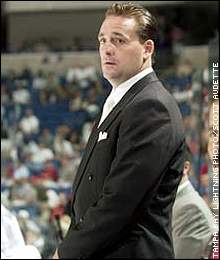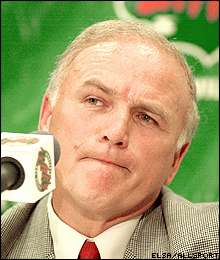 |
| Tuesday, October 17 By Brian Engblom Special to ESPN.com |
||||||
|
The Matchup: Steve Ludzik vs. Jacques Lemaire
The Question: What are the differences in approach between a young coach and one with a lot of experience when rebuilding -- or building -- a team?
Both seem up to the task
There is a large gap in age and experience between Ludzik, 38, and Lemaire, 55. Lemaire coached for seven NHL seasons in New Jersey and led them to a Stanley Cup in 1995. After a couple of seasons off, he became the first coach of the Minnesota franchise. But Ludzik paid his dues at the lower levels, winning a Turner Cup with the IHL's Detroit Vipers and leading the Vipers to two other finals. When new coaches get their first NHL job, people wonder where the coach has been and what he has accomplished. Ludzik won at the minor-league level, and that's all you can ask. Like Lemaire, who won eight Stanley Cups as a player with Montreal, Ludzik was an NHL player for nine seasons. He understands the NHL and what it's like to be a player. That's important for coaches in today's game because players can easily attribute a coach's failures to his lack of playing experience. The GM and the coach must see the game the same way, and that's the case for both Lemaire and Ludzik. Lemaire and Wild general manager Doug Risebrough were teammates on four Stanley Cup teams in Montreal. Ludzik and Lightning GM Rick Dudley, meanwhile, coached together in Detroit. Coaches and GMs need confidence in each other because, in these two young franchises, there will be rocky times. Wins are few and far between at the beginning, and the coach and GM must have patience, teach a similar philosophy and assess talent. Because his talent pool is shallow, Lemaire is in a completely different environment in Minnesota than he was in New Jersey. Depending on your perspective, Lemaire is either credited for, or accused of, spawning the trap. It was a plan that earned the Devils the Cup in 1995. Even though the trap has been around for years, people felt the Devils were playing it for 60 minutes, but Lemaire never really agreed with that perception. I played with Lemaire in Montreal, and we were taught about responsibility defensively. Lemaire just refined it more and took it to another level. The question now facing Lemaire and the Wild is the same one other new franchises face: What style of hockey do they want to play? Do they want to play defense and try to win anyway they can, even if it looks boring? Nashville, for example, made a conscious decision not to play the trap and to build an up-tempo, forechecking team built on speed. The Predators didn't want to be a defensive-oriented team and perhaps be too boring while trying to sell hockey to a new town. The decision is no different for Lemaire and Risebrough in Minnesota. But Minnesota is a hockey state; perhaps Lemaire and Risebrough have more leverage to play any style because the crowd understands hockey. Ludzik seems to favor a more aggressive style. He doesn't appear to be the kind of coach who will put together a trap team and play too conservative. He can't harness a player with superstar potential like Vincent Lecavalier. Ludzik wants to continue teaching the 20-year-old phenom the game the way Jacques Demers did before him. Ludzik has an advantage over Lemaire because he has Lecavalier and other strong players on his roster. In Minnesota, the jury is still out. Maybe Lemaire will surprise some people this time. For now he has to use what personnel he has, because the Wild drafted the team from scratch, and the talent is limited. It will take at least a half-dozen games for Lemaire to see what he has and which players do a strong job every night. Brian Engblom is a color commentator and analyst for ESPN's NHL coverage. He played 11 seasons in the NHL. | ||||||



